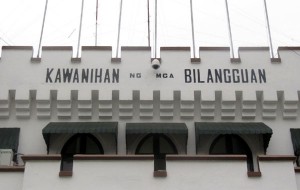Sis says Cadavero paid off jail officials, police to escape

FILE PHOTO
MANILA, Philippines—Ricky Cadavero, the alleged leader of the Ozamiz robbery gang, had paid the jail warden and guards of the national penitentiary in Muntinlupa City a hefty sum of money for his escape and the policemen of Cavite for his protection afterward.
This is what Cadavero had told his sister Rosalinda, a Saudi Arabia-based housewife, who returned to the country on Tuesday upon learning of her brother’s death.
“They killed him for fear he would spill information about these payoffs. They knew that because of pressure he would eventually speak out,” said Rosalinda, 37, who is married to an Indian national in Saudi Arabia.
Rosalinda and her mother, Luzviminda, who are natives of General Santos City, admitted that Ricky, also called “Kambal,” 36, had led criminal activities in pursuit of money.
“But where did it go? Look at this, he had not even left a single cent for his burial. All the money he had stolen went to them (police and jail guards),” Rosalinda said in an interview at the Eastern Funeral Homes in Muntinlupa City where the body of Cadavero was being autopsied.
Article continues after this advertisementShe added that in a telephone conversation sometime last December, Ricky told her that he was able to escape after he paid the jail warden of the New Bilibid Prison P500,000 and the jail guards P200,000 to P300,000 each.
Article continues after this advertisement“They allowed him to easily slip out of the (NBP),” Rosalina said. This was contrary to police claims last December 8 that three men posing as Cadavero’s visitors fired at the guards at the Reception and Diagnostic Center (RDC) where he was being held prior to being transferred to the major compound.
Chief Supt. Benito Estipona, the sacked head of the Calabarzon police who was the director of the Southern Police District at the time, complained back then that the escape, which happened at 6 a.m., was reported to the police three hours later.
This week, a criminal cases for evasion through negligence under Article 224 of the Revised Penal Code, were filed against Prison Guards 1 Roberto Tensuan, Eduardo Aquino, Niño De Vera and Oswaldo Montes. Slapped with an administrative case for negligence were Prison Security Officer 1 Geraldo Salamat, Prison Guard 3 Ronilo Salonga and Prison Guard 1 Rodolfo Geronimo.
Rosalinda said since Cadavero’s escape in December, he was able to roam Cavite without fear of being arrested.
“Our last conversation was on June 14. I was in Riyadh and I called him. He was driving then. I told him to stop taking illegal jobs and be careful when going out of the house. He was just out of Bilibid and the authorities could still be searching for him,” Cadavero’s sister said. “He said, ‘I am no longer afraid. I had paid all of the policemen in Cavite.’”
But as to how much and who were on the take among the Cavite police, Rosalinda said her brother did not tell her.
Thus, when she saw in the news that her brother had been rearrested and he was pleading for the Commission on Human Rights’ help, she knew he was already a dead man.
“He would no longer be kept alive because he knew so many things about the involvement of the police officers and jail guards,” she said.
During Cadavero’s arrest in Cavite on October 12, 2012, together with his live-in partner Fe Tolentino and two other suspected members of the group identified as Randy Maratas and Avelino Lagata, the SPD said the gang leader had P1.2 million in three bank accounts, three sport utility vehicles—a Mitsubishi Montero, a Honda CR-V and a Toyota Innova—which the arresting team led by then Chief Insp. Danilo Mendoza had seized from him.
Rosalinda said all of her brother’s loot—cash on hand amounting the P1 million, money in the bank accounts, and the vehicles—were taken by the policemen of SPD.
After the arrest, Luzviminda said Mendoza told her wryly that she should thank the police for keeping her son alive “despite an order from the top to kill him.”
Luzviminda and Rosalinda are both asking the police: “Where did the millions and the car go?”
Rosalinda said the police had no right to execute her brother even if he was a known criminal.
“Kahit kriminal yun, may karapatan pa rin ‘yun mabuhay kahit sa loob ng bilangguan. (Even if he was a criminal, he had the right to live even if behind bars),” she said.
Rosalinda said she and her family were leaving the matter of filing of charges against her brother’s killers to the government since they no longer had the resources to pursue the case.
“We no longer know where to get the money for the funeral expenses and the transportation of his body from Manila to GenSan. How can you expect us to hire a lawyer?” she said.
She noted that Cadavero “started [his illegal activities] penniless and died penniless.”
He could have changed his life when Rosalinda offered him a job in Saudi Arabia last year, but back then the man had no passport and was already wanted by the police.